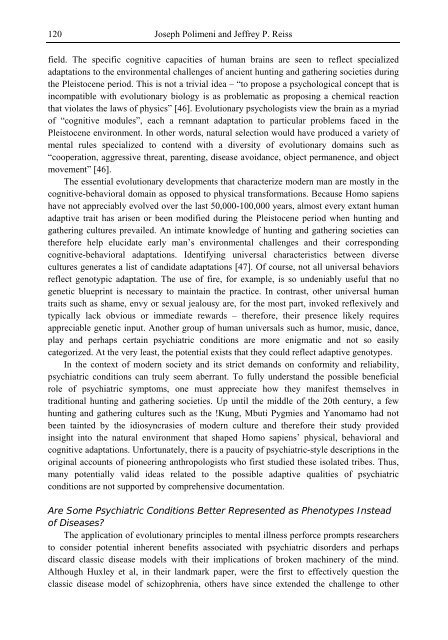Schizophrenia Research Trends
Schizophrenia Research Trends
Schizophrenia Research Trends
- No tags were found...
Create successful ePaper yourself
Turn your PDF publications into a flip-book with our unique Google optimized e-Paper software.
120Joseph Polimeni and Jeffrey P. Reissfield. The specific cognitive capacities of human brains are seen to reflect specializedadaptations to the environmental challenges of ancient hunting and gathering societies duringthe Pleistocene period. This is not a trivial idea – “to propose a psychological concept that isincompatible with evolutionary biology is as problematic as proposing a chemical reactionthat violates the laws of physics” [46]. Evolutionary psychologists view the brain as a myriadof “cognitive modules”, each a remnant adaptation to particular problems faced in thePleistocene environment. In other words, natural selection would have produced a variety ofmental rules specialized to contend with a diversity of evolutionary domains such as“cooperation, aggressive threat, parenting, disease avoidance, object permanence, and objectmovement” [46].The essential evolutionary developments that characterize modern man are mostly in thecognitive-behavioral domain as opposed to physical transformations. Because Homo sapienshave not appreciably evolved over the last 50,000-100,000 years, almost every extant humanadaptive trait has arisen or been modified during the Pleistocene period when hunting andgathering cultures prevailed. An intimate knowledge of hunting and gathering societies cantherefore help elucidate early man’s environmental challenges and their correspondingcognitive-behavioral adaptations. Identifying universal characteristics between diversecultures generates a list of candidate adaptations [47]. Of course, not all universal behaviorsreflect genotypic adaptation. The use of fire, for example, is so undeniably useful that nogenetic blueprint is necessary to maintain the practice. In contrast, other universal humantraits such as shame, envy or sexual jealousy are, for the most part, invoked reflexively andtypically lack obvious or immediate rewards – therefore, their presence likely requiresappreciable genetic input. Another group of human universals such as humor, music, dance,play and perhaps certain psychiatric conditions are more enigmatic and not so easilycategorized. At the very least, the potential exists that they could reflect adaptive genotypes.In the context of modern society and its strict demands on conformity and reliability,psychiatric conditions can truly seem aberrant. To fully understand the possible beneficialrole of psychiatric symptoms, one must appreciate how they manifest themselves intraditional hunting and gathering societies. Up until the middle of the 20th century, a fewhunting and gathering cultures such as the !Kung, Mbuti Pygmies and Yanomamo had notbeen tainted by the idiosyncrasies of modern culture and therefore their study providedinsight into the natural environment that shaped Homo sapiens’ physical, behavioral andcognitive adaptations. Unfortunately, there is a paucity of psychiatric-style descriptions in theoriginal accounts of pioneering anthropologists who first studied these isolated tribes. Thus,many potentially valid ideas related to the possible adaptive qualities of psychiatricconditions are not supported by comprehensive documentation.Are Some Psychiatric Conditions Better Represented as Phenotypes Insteadof Diseases?The application of evolutionary principles to mental illness perforce prompts researchersto consider potential inherent benefits associated with psychiatric disorders and perhapsdiscard classic disease models with their implications of broken machinery of the mind.Although Huxley et al, in their landmark paper, were the first to effectively question theclassic disease model of schizophrenia, others have since extended the challenge to other
















